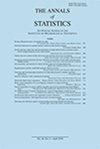双切片有助于对高维截尾数据进行充分的降维
IF 3.2
1区 数学
Q1 STATISTICS & PROBABILITY
引用次数: 5
摘要
本文为弱建模假设下的高维生存数据分析提供了一个统一的框架和有效的算法。特别是,它既没有参数分布假设,也没有线性回归假设。它只假设生存时间T通过协变量的低维线性组合依赖于高维协变量向量X ΓX。允许审查时间与给定协变量的生存时间有条件地独立。这个通用框架包括许多流行的参数和半参数生存回归模型作为特殊情况。提出的算法产生了许多具有理论保证的实际有用的输出,包括T |X的充分降维子空间的一致估计,T的条件分布函数的一致一致Kaplan-Meier型估计和条件分位数生存时间的一致估计。我们的渐近结果显著地将经典的删节数据充分降维理论(特别是Li et al. 1999)和著名的非参数Kaplan-Meier估计扩展到协变量数p随样本量n呈指数快速发散的设置。我们通过模拟和实际数据示例证明了所提出的新估计的良好性能。本文章由计算机程序翻译,如有差异,请以英文原文为准。
Double-slicing assisted sufficient dimension reduction for high-dimensional censored data
This paper provides a unified framework and an efficient algorithm for analyzing high-dimensional survival data under weak modeling assumptions. In particular, it imposes neither parametric distributional assumption nor linear regression assumption. It only assumes that the survival time T depends on a high-dimensional covariate vector X through low-dimensional linear combinations of covariates ΓX. The censoring time is allowed to be conditionally independent of the survival time given the covariates. This general framework includes many popular parametric and semiparametric survival regression models as special cases. The proposed algorithm produces a number of practically useful outputs with theoretical guarantees, including a consistent estimate of the sufficient dimension reduction subspace of T |X, a uniformly consistent Kaplan-Meier type estimator of the conditional distribution function of T and a consistent estimator of the conditional quantile survival time. Our asymptotic results significantly extend the classical theory of sufficient dimension reduction for censored data (particularly that of Li et al. 1999) and the celebrated nonparametric Kaplan-Meier estimator to the setting where the number of covariates p diverges exponentially fast with the sample size n. We demonstrate the promising performance of the proposed new estimators through simulations and a real data example.
求助全文
通过发布文献求助,成功后即可免费获取论文全文。
去求助
来源期刊

Annals of Statistics
数学-统计学与概率论
CiteScore
9.30
自引率
8.90%
发文量
119
审稿时长
6-12 weeks
期刊介绍:
The Annals of Statistics aim to publish research papers of highest quality reflecting the many facets of contemporary statistics. Primary emphasis is placed on importance and originality, not on formalism. The journal aims to cover all areas of statistics, especially mathematical statistics and applied & interdisciplinary statistics. Of course many of the best papers will touch on more than one of these general areas, because the discipline of statistics has deep roots in mathematics, and in substantive scientific fields.
 求助内容:
求助内容: 应助结果提醒方式:
应助结果提醒方式:


